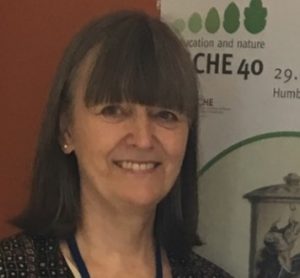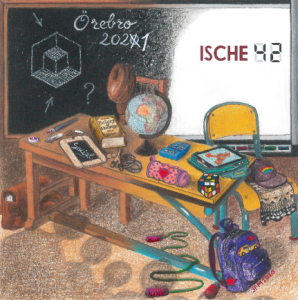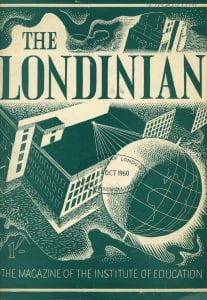Looking from Above and Below: Rethinking the Social in the History of Education
By utnvgbr, on 8 July 2021
ISCHE 42 Virtual Conference: Looking from Above and Below: Rethinking the Social in the History of Education, 11th-24th June 2021
By Maria Williams, UCL
I spent the last two weeks of June at ISCHE 42, the first virtual conference of the International Standing Conference for the History of Education. The conference was originally scheduled to take place at Örebro University, Sweden in 2020 but postponed and held virtually due to COVID 19. I was one of 65 early career researchers (ERCs) among the 454 participants from 53 countries. ISCHE kindly allowed the ERCs to attend for free. The theme ‘Looking from Above and Below: Rethinking the Social in the History of Education’ resulted in a wide range of papers.
 This was my fourth ISCHE, and like previous ones, it provided great opportunities to set my own research within a broader global comparative framework. I am currently researching early English Montessori educators. I was, therefore, delighted to find two scholars giving papers on the subject. Fabienne Serina-Karsky’s was on Miss Cromwell, who used the Montessori Method with orphans in First World War France. Christina Rothen looked at Catholic sisters who used the Method in kindergartens in German-speaking Switzerland. Panels featuring progressive education gave further contextual data. I was really impressed with Lauri Luoto’s use of UCINET software in social network analysis. The approach brings qualitative and quantitative relational data together to visualise the dynamics of educational change. Lauri, from the University of Turku, Finland, assured the audience that the software is not expensive or difficult to use. I am seriously tempted to investigate!
This was my fourth ISCHE, and like previous ones, it provided great opportunities to set my own research within a broader global comparative framework. I am currently researching early English Montessori educators. I was, therefore, delighted to find two scholars giving papers on the subject. Fabienne Serina-Karsky’s was on Miss Cromwell, who used the Montessori Method with orphans in First World War France. Christina Rothen looked at Catholic sisters who used the Method in kindergartens in German-speaking Switzerland. Panels featuring progressive education gave further contextual data. I was really impressed with Lauri Luoto’s use of UCINET software in social network analysis. The approach brings qualitative and quantitative relational data together to visualise the dynamics of educational change. Lauri, from the University of Turku, Finland, assured the audience that the software is not expensive or difficult to use. I am seriously tempted to investigate!
My research has explored the interface between secularism and faith. I found the panel ‘Christianity as a National Value Base in Public Schooling – a Hidden Aspect of Nordic Modernity’ really thought provoking. It featured papers and responses from, Urban Clas Claesson, Esbjörn Larsson, Emma Hellström, Jakob Evertsson, Merethe Roos and Mette Buchardt. It brought to light the relatively unexplored political and social influence of liberal Christians on educational policy until the mid-twentieth century. Opportunities to hear papers on the under-represented area of post-colonial Africa are always welcome. These included ‘Political Resistance in the 1976 Soweto Uprising: A Social Historical Perspective’ by Johannes Seroto and ‘Second Class Education for Second Class Citizens? Education of Urban and Rural Dwellers in Post-colonial Nigeria, 1960 to 2018’ by Grace Akanbi.
I was also able to see how colleagues, who presented at the 2020 ICHRE virtual conference, have progressed with their research. Hsiao-Yuh Ku, (known to her friends at ICHRE as Jenny) is building on her work on education and democracy. Her paper on Brian Simon and the comprehensive movement, demonstrated how an academic can influence policy decisions. Fabio Pruneri is now contributing to a major national research project critically mapping the school system as it developed in southern regions of Italy from the mid-19th to the early-20th century. This ground-breaking scholarship is reversing established historiography by using quantitative research from the bottom up. The conference theme was ideally suited to the research of Lajos Somogyvári who presented on history of education in Communist Hungary, looking from below. His paper at ICHRE 2020 used reports of emigrant students and teachers. This year at ICSHE, life history interviews provided an additional perspective demonstrating the complex reality of the times.
 Special Working Groups (SWGs) provide a good opportunity for ECRs, to meet annually with experienced scholars from around the globe. I attended the first meeting of the SWG ‘Gendering Local, National, Regional, Transnational and Supra-National Histories of Education’ in Berlin in 2018, so was pleased to be able to attend two panels on the subject this time. Papers included Joyce Goodman’s on ‘Defining the University Woman’ and Talia Tadmor Shimony’s on the unmarried teacher, professional female and revolutionary female teachers bringing European ideas to Ottoman Palestine. Sayaka Nakagomi and Setsuko Kagawa gave papers on the impact of time studying and working in England and Sweden on two Japanese women educators.
Special Working Groups (SWGs) provide a good opportunity for ECRs, to meet annually with experienced scholars from around the globe. I attended the first meeting of the SWG ‘Gendering Local, National, Regional, Transnational and Supra-National Histories of Education’ in Berlin in 2018, so was pleased to be able to attend two panels on the subject this time. Papers included Joyce Goodman’s on ‘Defining the University Woman’ and Talia Tadmor Shimony’s on the unmarried teacher, professional female and revolutionary female teachers bringing European ideas to Ottoman Palestine. Sayaka Nakagomi and Setsuko Kagawa gave papers on the impact of time studying and working in England and Sweden on two Japanese women educators.
Whilst I was prepared for the use of Zoom, Whova, the virtual event platform, chosen by local organisers at Örebro University, Sweden and the ISCHE team proved a real eye opener. It gave easy access, including on mobiles, to the keynotes and panels. Speakers had recorded their presentations in advance. Videos of these are still accessible to participants on Whova. Sessions ran smoothly as each one was facilitated by one of the ISCHE technical assistants, students from universities in Berlin, Cologne, Münster, and Groningen. More tech-savvy participants used Whova to the full. Krishna Kanta Roy who is researching the history of computer education in India, used the apps to set up groups to enable the rest of us to share experience, ideas and photographs.
I am now looking forward to ISCHE 43 in Milan next year and ISCHE 44 in Budapest in 2023. Meanwhile, I hope to see old friends and new at the ICHRE virtual day conference on 15th July Events | UCL International Centre for Historical Research in Education
 Close
Close


